One of the first things, for instance, he would find would be Eton, a place transformed, indeed, by modern aristocracy, but still enjoying its mediæval wealth and remembering its mediæval origin. If he asked about that origin, it is probable that even a public schoolboy would know enough history to tell him that it was founded by Henry VI. If he went to Cambridge and looked with his own eyes for the college chapel which artistically towers above all others like a cathedral, he would probably ask about it, and be told it was King's College. If he asked which king, he would again be told Henry VI. If he then went into the library and looked up Henry VI. in an encyclopaedia, he would find that the legendary giant, who had left these gigantic works behind him, was in history an almost invisible pigmy. Amid the varying and contending numbers of a great national quarrel, he is the only cipher. The contending factions carry him about like a bale of goods. His desires do not seem to be even ascertained, far less satisfied. And yet his real desires are satisfied in stone and marble, in oak and gold, and remain through all the maddest revolutions of modern England, while all the ambitions of those who dictated to him have gone away like dust upon the wind.
Edward the Confessor, like Henry VI., was not only an invalid but almost an idiot. It is said that he was wan like an albino, and that the awe men had of him was partly that which is felt for a monster of mental deficiency. His Christian

